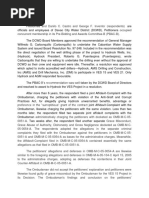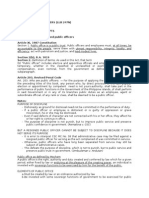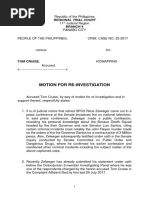Adminlaw-Final Exam Sinapuelas
Adminlaw-Final Exam Sinapuelas
Uploaded by
Jennifer SinapuelasCopyright:
Available Formats
Adminlaw-Final Exam Sinapuelas
Adminlaw-Final Exam Sinapuelas
Uploaded by
Jennifer SinapuelasCopyright
Available Formats
Share this document
Did you find this document useful?
Is this content inappropriate?
Copyright:
Available Formats
Adminlaw-Final Exam Sinapuelas
Adminlaw-Final Exam Sinapuelas
Uploaded by
Jennifer SinapuelasCopyright:
Available Formats
SINAPUELAS, JENNIFER G.
ADMINISTRATIVE LAW FINAL EXAM
ATTY. MACKI LABALAN
No, the Civil Service Commission should not approve the promotional appointment of
Amelia.
Public officers are strictly prohibited by the Constitution to appoint family members up to
the fourth civil degree of consanguinity and affinity, including wife to any public office.
Here, Amelia, wife of mayor San Jose, was appointed her as City Treasurer from the city
employees. The office sought to be appointed is a public office and from the fact the Amelia is a
wife of mayor San Jose, who is a public officer, is prohibited to be appointed in such position as
City Treasurer. Mayor San Jose as a public officer cannot appoint his wife to any public office.
Also, mayor San Jose has no delegated power to appoint any officials because it is only
delegated to the President.
Hence, the Civil Service Commission should not approve the promotional appointment of
Amelia on the ground of prohibition.
II
No, the action will not prosper.
Jurisprudence provides that a mandamus is a remedy available to a party seeking for the
individual or a quasi -administrative agency to be compelled to perform an act which such act is
obligatory to them under the law.
Here, a building permit applied by Tikboy for the building of his house was denied by the
City Engineering office of Quezon City. Although it is the duty of the City Engineering Office to
grant and issue a permit among applicants of building permit, the law cannot compel them to
grant such application if it is proper for them to deny the application of permit. The City
engineering office already did its part in discharging its duty by denying the application.
Hence, the petition for mandamus filed will not prosper.
III
No, if I were a Judge, I will not grant the motion to dismiss of DENR.
The case decided by the Supreme Court ruled that administrative remedies is available
only when the offender violates some acts related to his official function as a public officer.
Further, as provided under the Rules of Criminal procedure, questions of law shall be moved by
a party through filing a petition for certiorari directly to the Supreme Court.
Here, the issue sought to be dismissed is the petition for nullification of DENR Circular
No. 123-15 which is a question of law. Administrative remedy cannot be availed here.it should
be filed directly to the Supreme Court.
Thus, motion to dismiss will not be granted for lack of merit.
IV
The petition of Juan Tamad will be denied.
Election Code of the Philippines provides that the COMELEC has the power to
promulgate rules and regulations relative to the conduct of election.
In the given scenario, COMELEC issued a Resolution 23-309, pursuant to its rule-
making power which requires all the candidates who will file their COC to submit a drug test
result together with their COC. The issuance of resolution is ministerial in nature to its rule-
making power vested by the Constitution. It is a valid exercise of their duties and functions
relative to the peaceful conduct of election.
Thus, Juan Tamad’s petition questioning the policy of COMELEC will be denied due to
lack of merit.
V
The appeal will be denied.
The 1987 Constitution expressly defines due process as a right accorded to the accused to
establish their right by defending and explaining their cause to free them from any accusations
tried against them.
` In this case, upon imposing charges of unbecoming and prejudicial to the best interest of
the service, Lolita and Rosario were required by the Landbank to submit their respective position
papers. This requirement allows them to explain and defend themselves. This constitutes due
process accorded to them by Landbank because they could have the opportunity to be heard.
Before they were required to submit their position papers, it is presumed that they are also
informed of their guilt.
Hence, Lolita and Rosario’s contention is untenable and be denied.
VI
a.
Mokang’s contention is correct.
Jurisprudence enumerated jurisdiction of Ombudsman. The Ombudsman is responsible
for investigating and prosecuting public officials and employee charged with graft and corruption
offences. It has the power to investigate and prosecute any public official or employee except for
impeachable officials.
Here, Mokang, is an appointed student regent of Quiapo University. Although receiving
funds form the national government and not utilizing such for original purpose which is to
rehabilitate the library of the said institution, she cannot be charged for the misuse of funds under
the Office of the Ombudsman. She is not a public officer as contemplated under the definition of
a public officer.
Hence, MOkang cannot be charged before the Ombudsman and her contention is correct.
b.
Mokang’s motion to quash will be granted.
Jurisdiction of Sandiganbayan includes public officers and employees accused of graft
and corruption and offences committed in the discharge of its official function, and whose
employee has a salary grade27.
In the case herein, Mokang is a student regent of Quiapo University. She and Tanggol
were charged by the Sandiganbayan for violation of anti-graft and corruption Practices Act.
Although the funds are not accumulated properly to the original purpose, they are not considered
public officers as provided by law.
Thus, Mokang and Tanggol cannot be charged by the Sandiganbayan for violation of anti-
graft and corruption Practices Act. Motion to quash will be granted.
VII
Petition for disqualification will be granted.
Election Code prohibits a candidate to involve in premature campaigning. Premature
campaigning includes acts like forming associations or other group of persons for the purpose of
soliciting votes and undertaking any campaign against a candidate. However, a candidate is
liable for an election offense only for acts done during the campaign period, not before the
campaign period.
Here, after filling Gretchen’s COC, she, together with other supporters launched a
motorcade in several places. The motorcade in several places does not constitutes pre- mature
campaigning since it was done before the campaign period. The inclusion of time after filing of
COC is immaterial since the basis of determining the commission of violation is the period of
campaign not the period of filing COC.
Thus, the Petition to disqualify her on the ground that the motorcade that constitutes a
premature campaigning will be gran
VIII
No, the rule is not valid.
Jurisprudence explains that for a rule to be valid, it should be promulgated by the quasi-
judicial bodies or administrative agencies vested such power to promulgate laws.
Here, DENR added electronic fishing rules as an additional prohibition to the prior Law
enacted by the Congress to Fisheries Law. DENR is not the proper body, or it has no power to
promulgate such prohibition as an addition to the enacted laws of Fisheries Law. It is only the
Fisheries Department has the vested power to add some prohibition.
Hence, the rule added by the DENR as prohibition is not valid.
IX
a.
Yes, the contention of Mayor X will prosper.
Election Code of the Philippines provides that an elected official's previous misconduct
or wrongdoing is forgiven or condoned once they are re-elected or are allowed to complete their
term without any challenge to their qualifications.
Here, Mayor X was re-elected again for his third term as mayor of Usok while his case
was still pending. This re-election condoned his criminal case pending in the Office of the
Ombudsman.
Hence, Mayor X’s administrative liability is extinguished.
b.
No, mayor X cannot run as mayor in Usok in 2022.
Omnibus Election Code provides that municipal officials has only three-time limit.
Here, suppose that Court of Appeals granted mayor X and reinstated him back to his
office in 2021, his term of office is already 3rd times in this year.
Thus, mayor X can no longer run as mayor in Usok.
COMELEC’s contention is unatenable.
The Constitution expressly vested right to COMELEC to promulgate rules and
regulations relative on the conduct of election. One of which is the regulation of posting of
propaganda materials on campaign period.
In the given case, Resolution 9615 of COMELEC provides rules that would implement
Fair Election Act, One of which is the provisions of the resolution on the posting of any election
propaganda or materials on public utility vehicles and within the premise of public transport.
Then later on COMELEC contends that it may impose the prohibition during the election
pursuant to its regulatory powers delegated by the Constitution. The latter contention will defeat
the prior rules and regulations of the COMELEC. The COMELEC should have a consistent
implementation of its rules in exercising its regulatory power. It cannot regulate its rules which
will impede the successful implementation of its rules. The said imposition of prohibition during
election is prohibited because posting of propaganda should be done prior to election. If it is
done during the election, then it will impede the implementation of its own rules.
Hence, COMELC’s contention cannot be given credence.
XI
No, Butz Aquino is not qualified to run as Congressman of Makati City.
One of the qualifications stated under the Omnibus Election Code among Congressman is
the residency requirement. It should be shown that a candidate upon filing the COC must have a
resident for not less than 1 year immediately preceding the election.
Here, Butz Aquino resides in Tarlac when he filed his COC for Congressman in Makati
City. The fact that he rented condo in Makati City 1 year before the election does not qualify the
requirement of residency. Residence is where a candidate permanently resides.
Hence, Butz Aquino is not qualified to run as Congressman on Makati City on for the
lack of residency requirement.
XII
A.
The threefold liability of a public officer are: first, criminal liability. A public officer will
be held criminally liable if he committed crime punishable by the Revised Penal Code such as
graft and corruption, culpable violation of the public office, bribery and other high crimes.
Second, is the civil liability. Public officer is liable to whatever act done which causes damage to
another. He/ she may be sued for moral, temperate, nominal, actual and exemplary damages.
The third one is the administrative liability. A public officer will be held administratively
liable if committed a violation of rules and regulations promulgated by the quasi-judicial bodies
and administrative bodies vested by Law to promulgate and implement such rules and
regulations.
B.
The contention of Tata Riks has merit.
Jurisprudence provides that administrative case may be filed to public officers
committing violation on laws and regulations of administrative bodies, upon the exercise of his
official function as public officer.
Here, Tata Riks reaches the age of mandatory retirement of 65 years old while his
administrative case is pending. His retirement makes him not a public officer anymore and not
functioning duties of public officers.
Therefore, Tata Riks cannot be anymore subject to administrative liability.
You might also like
- Gonzales vs. Serrano (DIGEST)Document3 pagesGonzales vs. Serrano (DIGEST)Briant Rosario67% (3)
- 59 Digest Fajardo V Atty. AlvarezDocument1 page59 Digest Fajardo V Atty. AlvarezSharon G. Balingit100% (2)
- Castro Vs Yamson Res JudicataDocument3 pagesCastro Vs Yamson Res JudicataLalaine V. DelimaNo ratings yet
- FACTS: Petitioner and Private Respondent Were Candidates For The Position of Governor, EasternDocument11 pagesFACTS: Petitioner and Private Respondent Were Candidates For The Position of Governor, EasternJepoy Nisperos ReyesNo ratings yet
- Law On Public Officers Reviewer (Dean Roy)Document46 pagesLaw On Public Officers Reviewer (Dean Roy)PBWGNo ratings yet
- Clamosa (Pubcorp Finals)Document3 pagesClamosa (Pubcorp Finals)Charisse Ayra ClamosaNo ratings yet
- AdminelecDocument11 pagesAdminelecJan Erik ManigqueNo ratings yet
- Digest 11-15Document4 pagesDigest 11-15Your Public ProfileNo ratings yet
- Digest A-BDocument14 pagesDigest A-BElla MillareNo ratings yet
- 6 - Carpio-Morales v. CADocument3 pages6 - Carpio-Morales v. CARan MendozaNo ratings yet
- Consti 2 Cases Equal ProtectionDocument6 pagesConsti 2 Cases Equal ProtectionPearl PerezNo ratings yet
- Law 147-Administrative and Election LawsDocument3 pagesLaw 147-Administrative and Election LawsBianka SylveeNo ratings yet
- Conchita Carpio Morales V BinayDocument1 pageConchita Carpio Morales V BinayHanna Ayon100% (1)
- Consti 2 CasesDocument15 pagesConsti 2 CasesCarlos DauzNo ratings yet
- Monroy VS CaDocument2 pagesMonroy VS CaGel de GraciaNo ratings yet
- Constitutional Commission DigestsDocument12 pagesConstitutional Commission DigestsJaime MenesesNo ratings yet
- Mitra Vs SubidoDocument16 pagesMitra Vs SubidoMark John Geronimo BautistaNo ratings yet
- 1 660 Art III CollatedDocument487 pages1 660 Art III CollatedGabriel ReyesNo ratings yet
- Article VII, Sec. 4 Brillantes vs. COMELEC G.R. No. 163193 June 15, 2004 FactsDocument6 pagesArticle VII, Sec. 4 Brillantes vs. COMELEC G.R. No. 163193 June 15, 2004 FactsMond RamosNo ratings yet
- Tupas VDocument2 pagesTupas VCentSeringNo ratings yet
- PJ 2018 Prebarnotes PubofcrDocument13 pagesPJ 2018 Prebarnotes PubofcrJannina Pinson RanceNo ratings yet
- Pub CorpDocument14 pagesPub Corpdll123No ratings yet
- PLJ Volume 36 Number 2 - 04 - Rolando R. Arbues, Et. Al. - Public Officers and Election LawDocument25 pagesPLJ Volume 36 Number 2 - 04 - Rolando R. Arbues, Et. Al. - Public Officers and Election LawArgao Station FinestNo ratings yet
- Consti 1 Digest-set 9Document42 pagesConsti 1 Digest-set 9erianneongduNo ratings yet
- DP DigestDocument22 pagesDP DigestRock StoneNo ratings yet
- Consti Reviewer SMDocument5 pagesConsti Reviewer SMKaye NodgnalahNo ratings yet
- Pub Corp Long AssignmentDocument5 pagesPub Corp Long AssignmentbetterlucknextlifephNo ratings yet
- Telebap Vs ComelecDocument6 pagesTelebap Vs ComelecMark David DaculaNo ratings yet
- Cornejo Vs Provincial Board of RizalDocument7 pagesCornejo Vs Provincial Board of Rizalrols villanezaNo ratings yet
- Consti Cont CasesDocument46 pagesConsti Cont CasesCindy-chan DelfinNo ratings yet
- Carpio Morales Vs CA March 11Document2 pagesCarpio Morales Vs CA March 11Shiva100% (1)
- JM 2018 Barnotes PubofcrDocument11 pagesJM 2018 Barnotes Pubofcrej saysonNo ratings yet
- MMDA vs. Bel-Air Village FactsDocument8 pagesMMDA vs. Bel-Air Village FactsKim Jan Navata BatecanNo ratings yet
- Public Corporation DigestsDocument14 pagesPublic Corporation DigestsKim Jan Navata BatecanNo ratings yet
- Debulgado Vs CSCDocument2 pagesDebulgado Vs CSCJoel G. Ayon100% (1)
- Political Law Mock BarDocument7 pagesPolitical Law Mock Barlodrapbeh69No ratings yet
- Part IIDocument171 pagesPart IIDennis Aran Tupaz AbrilNo ratings yet
- General Instructions: Write Legibly and Answer Fully A Mere "Yes" and "No" Answer Will Not Be Given Any CreditDocument6 pagesGeneral Instructions: Write Legibly and Answer Fully A Mere "Yes" and "No" Answer Will Not Be Given Any CreditLeoj AnuleNo ratings yet
- Conducto Vs MonzonDocument2 pagesConducto Vs MonzonRaymond RoqueNo ratings yet
- © KristineconfesorDocument15 pages© KristineconfesorCnfsr KayceNo ratings yet
- Laws On Public Officers: Bar Review LecturerDocument11 pagesLaws On Public Officers: Bar Review LecturerErika Charmain Faye RicoNo ratings yet
- Certiorari - Digest - Villanueva Vs JBCDocument2 pagesCertiorari - Digest - Villanueva Vs JBCElijah B BersabalNo ratings yet
- Ismael Mathay Vs Court of AppealsDocument2 pagesIsmael Mathay Vs Court of AppealsEarl LarroderNo ratings yet
- Laurel Vs DisiertoDocument2 pagesLaurel Vs DisiertoBaldr BringasNo ratings yet
- Marmeto V COMELECDocument1 pageMarmeto V COMELECBaisy VillanozaNo ratings yet
- Special Third Division: ChairpersonDocument13 pagesSpecial Third Division: ChairpersonAndrolf CaparasNo ratings yet
- Constitutional 1 Notes (I-II) 1Document21 pagesConstitutional 1 Notes (I-II) 1ygtreasures2020No ratings yet
- Law On Public Officer Case DigestDocument14 pagesLaw On Public Officer Case Digestacinejodellav100% (2)
- Involuntary ServitudeDocument4 pagesInvoluntary ServitudeAngel BangasanNo ratings yet
- Yatco and Debulgado CaseDocument3 pagesYatco and Debulgado CaseArtemis SpecterNo ratings yet
- Parens Patriae, The State Has The Inherent Right and Duty To Aid Parents in The Moral Development of Their ChildrenDocument4 pagesParens Patriae, The State Has The Inherent Right and Duty To Aid Parents in The Moral Development of Their ChildrenSuzy NaeNo ratings yet
- Case Digest - PUBLIC CORPORATIONDocument13 pagesCase Digest - PUBLIC CORPORATIONcompiler123No ratings yet
- G.R. No. 149036 - Matibag v. BenipayoDocument38 pagesG.R. No. 149036 - Matibag v. BenipayoMA. CECILIA F FUNELASNo ratings yet
- Gaminde Vs Commission On AuditDocument20 pagesGaminde Vs Commission On AuditAnonymous mxl63ogomiNo ratings yet
- JD Batch 2017 Law On Public Officers and Election Law Case DigestsDocument54 pagesJD Batch 2017 Law On Public Officers and Election Law Case Digestsmi4keeNo ratings yet
- ConstiRev Week 6 First PartDocument9 pagesConstiRev Week 6 First Partjuna luz latigayNo ratings yet
- 45 Dumlao VS Comelec PDFDocument3 pages45 Dumlao VS Comelec PDFKJPL_1987No ratings yet
- Codilla Vs MartinezDocument3 pagesCodilla Vs MartinezMaria Recheille Banac KinazoNo ratings yet
- A Layman’s Guide to The Right to Information Act, 2005From EverandA Layman’s Guide to The Right to Information Act, 2005Rating: 4 out of 5 stars4/5 (1)
- The Economic Policies of Alexander Hamilton: Works & Speeches of the Founder of American Financial SystemFrom EverandThe Economic Policies of Alexander Hamilton: Works & Speeches of the Founder of American Financial SystemNo ratings yet
- G.R. No. 158960Document2 pagesG.R. No. 158960LJ Eugenio RosanesNo ratings yet
- Busuego Vs BusuegoDocument21 pagesBusuego Vs BusuegoEdmer Madronio DelacruzNo ratings yet
- 07 - C - PUBCORP Preventive Suspension Onwards 1 PDFDocument29 pages07 - C - PUBCORP Preventive Suspension Onwards 1 PDFinsert nameNo ratings yet
- Laurel vs. DesiertoDocument4 pagesLaurel vs. DesiertoRin KNo ratings yet
- Annual Report 2004Document216 pagesAnnual Report 2004Hasan ShabbirNo ratings yet
- Lasa 2020 Program FinalDocument214 pagesLasa 2020 Program FinalocelotepecariNo ratings yet
- Moral Recovery ProgramDocument6 pagesMoral Recovery ProgramMaryanNo ratings yet
- Public OfficersDocument37 pagesPublic OfficersPilacan KarylNo ratings yet
- PART 11 - Judiciary DepartmentDocument11 pagesPART 11 - Judiciary DepartmentJsimNo ratings yet
- COI Guidelines Ombudsman 2017Document14 pagesCOI Guidelines Ombudsman 2017Frida RustianiNo ratings yet
- I - Crim - SB-15-CRM-0135 - People Vs Ubana II, Et Al - 09 - 06 - 2017Document24 pagesI - Crim - SB-15-CRM-0135 - People Vs Ubana II, Et Al - 09 - 06 - 2017Micaela Jade (Micaela Jade)No ratings yet
- Pestano v. GRP-Human Rights CommitteeDocument3 pagesPestano v. GRP-Human Rights CommitteeEPZ RELANo ratings yet
- SEBI:-How It Protect The Interest of The InvestorsDocument12 pagesSEBI:-How It Protect The Interest of The InvestorsMonique RamirezNo ratings yet
- Letter To Legal Services Commissioner 20090928 (Draft)Document3 pagesLetter To Legal Services Commissioner 20090928 (Draft)James JohnsonNo ratings yet
- Policy Paper On The Right To Efficient, Effective, Responsive and Accountable GovernanceDocument79 pagesPolicy Paper On The Right To Efficient, Effective, Responsive and Accountable GovernancePriyanka TisseverasingheNo ratings yet
- Abs-Cbn Vs OmbudsmanDocument13 pagesAbs-Cbn Vs OmbudsmanPatricia Sanchez100% (1)
- Motion For ReinvestigationDocument5 pagesMotion For ReinvestigationGigiRuizTicarNo ratings yet
- Assignment On Ombudsman Act. FinalDocument6 pagesAssignment On Ombudsman Act. FinalSanjedah Binte HaiderNo ratings yet
- Graft and CorruptionDocument36 pagesGraft and CorruptionCHOSEN TABANASNo ratings yet
- Soria and Bista vs. Desierto, G.R. No. 153524-25, January 31, 2005Document8 pagesSoria and Bista vs. Desierto, G.R. No. 153524-25, January 31, 2005Mark Joseph ManaligodNo ratings yet
- BarOps 2nd SetDocument24 pagesBarOps 2nd SetVeah CaabayNo ratings yet
- Civics 8-Unit1Document10 pagesCivics 8-Unit1Yared HaileNo ratings yet
- Legres Case DigestDocument9 pagesLegres Case DigestWILHELMINA CUYUGANNo ratings yet
- Customer Grievance Redressal System 2019Document4 pagesCustomer Grievance Redressal System 2019Gaurav KhannaNo ratings yet
- Lokpal MainDocument13 pagesLokpal MainpriyanshuNo ratings yet
- MC 2016 002Document44 pagesMC 2016 002Apollo C. Batausa100% (1)
- Pub OffDocument98 pagesPub Offrgtan3No ratings yet

























































































